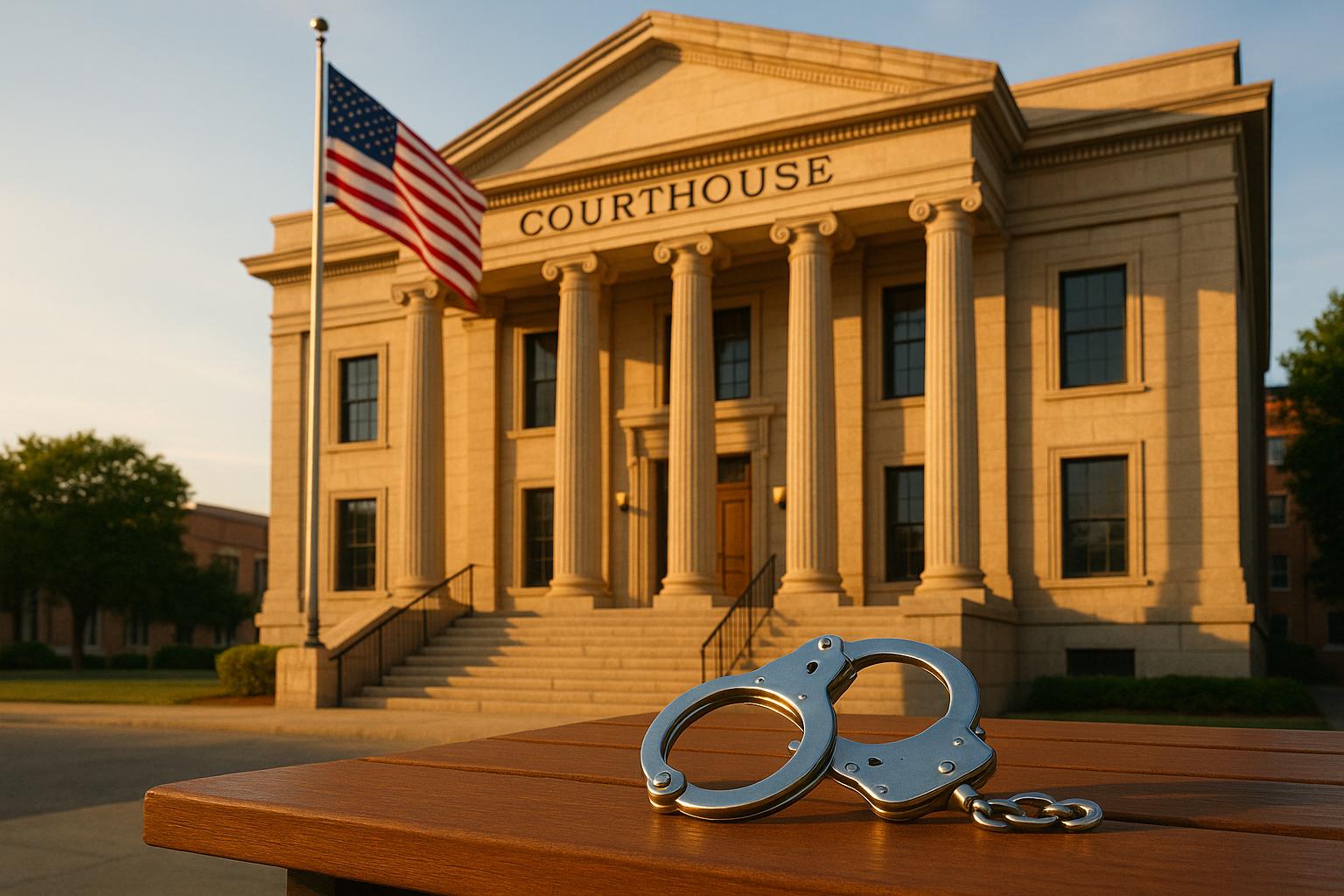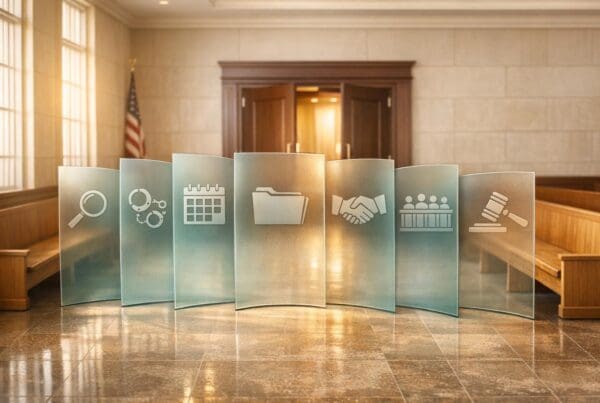South Carolina enforces strict measures against repeat offenders, with escalating penalties for recurring violations. Here’s what you need to know:
- DUI Penalties: Second DUI within 10 years triggers harsher fines, jail time, and license suspensions. Third or more DUIs within the same period lead to even stricter consequences, including mandatory ignition interlock devices.
- Habitual Traffic Offenders: Accumulating 3 major traffic convictions or 10 moving violations within 3 years can result in license revocation and felony charges for driving while suspended.
- Three Strikes Law: A third serious or violent felony conviction leads to life imprisonment without parole.
- Out-of-State Convictions: Comparable violations from other states count toward habitual offender status if they align with South Carolina laws.
Repeat offenders face not only legal penalties but also long-term challenges like employment difficulties and permanent records. Contesting habitual offender status or navigating these charges requires swift action and legal expertise. Skilled attorneys can help challenge errors, negotiate plea deals, and protect your rights.
South Carolina’s Repeat Offender Laws Explained
South Carolina has a structured approach to dealing with repeat offenders, distinguishing first-time violations from recurring offenses. These laws rely on specific definitions and timelines, which play a critical role in how charges are brought and sentences are determined.
Legal Terms You Need to Know
Understanding key legal terms is essential to grasp how repeat offender laws work in South Carolina.
Repeat DUI Offender: This term applies to anyone convicted of a second DUI within 10 years of their first conviction. For third or subsequent DUIs, all prior offenses must also fall within the last 10 years to qualify as a repeat offense. Both DUI and DUAC (Driving with an Unlawful Alcohol Concentration) convictions count toward this classification.
Habitual Traffic Offender: According to South Carolina Code Section 56-1-1020, there are two ways to be classified as a habitual traffic offender:
- Accumulating three or more serious convictions (e.g., DUI/DUAC, reckless driving) within a three-year period.
- Amassing ten or more moving violations, each carrying four or more points.
Conviction: South Carolina law defines a conviction broadly under Title 56. It includes not only guilty verdicts but also guilty pleas, nolo contendere pleas, bail forfeitures, and even violations of release conditions without bail. This applies regardless of whether the penalty is reduced, suspended, or probated.
Three Strikes Law: Under this law, any individual with two prior serious or violent felony convictions faces life imprisonment without parole upon a third conviction.
Out-of-State Convictions: DUI/DUAC convictions from other states, as well as comparable federal or municipal violations, are considered when determining habitual offender status, provided they fall within the 10-year look-back period.
Why South Carolina Has Harsher Penalties for Repeat Offenders
South Carolina’s stricter penalties for repeat offenders stem from a commitment to public safety and legislative priorities aimed at curbing habitual violations.
The primary focus is on protecting public safety, especially on the roads. The law targets individuals who repeatedly disregard traffic rules, posing significant risks to other drivers and pedestrians. As noted in the legislative declaration:
"The legislative declaration of policy also supports the ALC’s reading of the habitual offender statute. See id.§ 56-1-1010 (stating the policy behind the legislation is to provide for the safety of people on public roads, to deny driving privileges to those drivers who demonstrate indifference to traffic laws, and to discourage drivers from repeatedly violating traffic laws)."
Deterrence is another critical element. By imposing harsher penalties for repeat offenses, the legal system aims to discourage individuals from continuing to engage in risky or illegal behaviors. The escalating nature of these penalties is designed to make offenders reconsider their actions.
For serious and violent crimes, the "three strikes" law reflects a policy of incapacitating individuals who pose ongoing threats to society. Life imprisonment without parole for a third felony conviction underscores the state’s determination to permanently remove dangerous offenders from the community.
DUI-specific concerns also play a major role. Repeat DUI offenders face stricter consequences to address the dangers posed by impaired drivers. These penalties are tailored to reduce the risks associated with repeat offenses.
South Carolina’s legal framework also emphasizes recent behavior patterns over lifetime punishment. For instance, if a second DUI occurs more than 10 years after the first, it is treated as a first offense. However, repeat offenders generally lose access to pre-trial diversion programs, which may be available to first-time offenders.
The next section will delve into the specific penalties and sentencing guidelines for repeat offenders.
Penalties and Sentencing for Repeat Offenders
South Carolina takes a firm stance on repeat offenders, with penalties that grow more severe depending on the type of offense and prior convictions. Whether it’s general criminal activity, DUI violations, or traffic offenses, the consequences become increasingly tough with each subsequent violation.
General Criminal Repeat Offender Penalties
For those with prior criminal convictions, South Carolina courts impose stricter sentences. Individuals convicted of violent crimes or serious felonies often face mandatory minimum sentences and longer prison terms. Even non-violent repeat offenses can lead to harsher penalties compared to first-time offenders.
Repeat DUI Penalties
DUI penalties in South Carolina follow a stepped system. With each additional conviction, offenders face stiffer consequences, such as longer jail sentences, steeper fines, and extended license suspensions. Repeat offenders may also be required to install ignition interlock devices on their vehicles and complete alcohol or drug education programs, adding further layers of accountability.
Habitual Traffic Offender Consequences
Drivers classified as habitual traffic offenders encounter significant challenges. Their licenses may be suspended for extended periods, and driving during suspension can result in criminal charges. Regaining driving privileges involves paying outstanding fines, completing driver education courses, and proving financial responsibility. Beyond the legal penalties, this designation can affect employment opportunities and, in some cases, even lead to the forfeiture of vehicles.
How South Carolina Identifies and Prosecutes Habitual Offenders
In South Carolina, the process of identifying and prosecuting habitual offenders involves a combination of administrative tracking by the Department of Motor Vehicles (DMV) and criminal prosecution through the courts. The DMV’s classification system sets the stage for potential legal action.
How the South Carolina DMV Classifies Habitual Offenders
The South Carolina Department of Motor Vehicles (SCDMV) closely monitors driving records to identify habitual traffic offenders. This tracking system uses the date of each violation as the starting point for determining habitual offender status.
Drivers can be classified as habitual offenders under two main criteria:
- Accumulating three or more major traffic convictions within a three-year period.
- Racking up ten or more traffic convictions, each carrying four or more points, within the same three-year window.
Out-of-state convictions can also contribute to a habitual offender designation if they align closely with South Carolina’s traffic laws. For instance, in the 2018 case SCDMV v. Dover, the South Carolina Court of Appeals ruled that a Virginia "reckless driving" conviction didn’t qualify as a major violation under South Carolina law. The court found that Virginia’s definition – speeding over 80 mph – was more consistent with a speeding offense in South Carolina.
Once the SCDMV determines that a driver meets the habitual offender criteria, the driver is notified of the designation and the impending license revocation. Drivers have 30 days from receiving this notice to request a contested case hearing through the South Carolina Office of Motor Vehicle Hearings if they believe the classification is incorrect.
Court and Administrative Procedures
After the DMV classifies someone as a habitual offender, the legal process begins automatically. If a person is caught driving with a suspended or revoked license – or without a valid license – the DMV checks whether they are listed as a habitual offender.
If habitual offender status is confirmed, the DMV alerts the solicitor or Attorney General, initiating criminal prosecution. Driving as a habitual offender is a felony in South Carolina, carrying a prison sentence of up to five years. Penalties increase significantly if the offense leads to injury or death.
"A person found to be an habitual offender under the provisions of this article, who subsequently is convicted of operating a motor vehicle in this State while the decision of the Department of Motor Vehicles prohibiting the operation is in effect, is guilty of a felony and must be imprisoned not more than five years".
For offenses resulting in great bodily injury, the prison sentence can extend to 10 years. If the offense causes a fatality, the penalty increases to up to 20 years in prison.
Drivers who wish to contest their habitual offender status can appeal through administrative channels. Decisions by the DMV can be challenged before the Office of Motor Vehicle Hearings (OMVH) and, if necessary, escalated to the Administrative Law Court (ALC). During these hearings, drivers may dispute errors such as miscounted violations, misclassified offenses, or incorrectly included out-of-state convictions.
In addition to administrative appeals, criminal court proceedings can result in severe consequences, including jail time, heavy fines, and a permanent felony record. Such a record can have long-term effects on employment, housing, and other critical aspects of life.
sbb-itb-ce0cbb0
Legal Options for People Facing Repeat Offender Charges
Being charged as a repeat offender in South Carolina can feel overwhelming, but it doesn’t mean you’re out of options. The legal system provides pathways to challenge these serious allegations, and understanding your rights is crucial to shaping the outcome of your case.
Challenging Your Habitual Offender Status
If you’ve been labeled a habitual traffic offender by the South Carolina Department of Motor Vehicles (DMV), time is of the essence. You have 30 days to request a contested case hearing to dispute inaccuracies in the DMV’s classification. This could involve correcting errors like miscounted infractions or wrongful classifications. Successfully challenging these errors may help you regain your license earlier than expected. Taking this step also lays the groundwork for negotiating better bond terms and exploring plea agreements.
Bond and Plea Agreement Strategies
When facing repeat offender charges, securing favorable bond conditions can significantly impact your case. A skilled attorney will evaluate the strength of the prosecution’s evidence to determine whether negotiating a plea deal or proceeding to trial is the better option. Plea deals can sometimes result in reduced charges, lighter sentences, or avoiding a trial altogether.
Attorneys often scrutinize every piece of evidence – police reports, witness accounts, and forensic details – to uncover procedural mistakes that might weaken the case against you. Additionally, presenting mitigating factors like steady employment or strong community ties can help argue for more lenient bond terms or even release on your own recognizance.
Why You Need Experienced Legal Representation
Navigating repeat offender charges requires more than a basic understanding of the law – it demands a strategic approach. The consequences of these charges can ripple through your life, affecting job prospects, housing applications, and even professional licenses. That’s why having experienced legal counsel is essential.
Brendan M. Delaney Law Firm LLC brings over 24 years of defense experience to the table, offering a strong track record in challenging habitual offender designations and negotiating with prosecutors. Their approach prioritizes protecting your constitutional rights at every stage, from your initial consultation to trial or plea discussions.
With deep knowledge of South Carolina’s habitual offender laws, DMV procedures, and prosecution tactics, the firm ensures every defense option is thoroughly explored. They also offer free initial consultations, giving you a chance to discuss your case, ask questions, and gain clarity about your legal options. This supportive environment empowers you to make informed decisions about your defense strategy.
Understanding South Carolina’s Repeat Offender Laws
South Carolina takes a firm stance on repeat offenders by escalating penalties based on the type and frequency of offenses. This approach is rooted in the belief that habitual criminal behavior poses a heightened risk to public safety, warranting stricter consequences over time.
For instance, penalties for repeat offenses in traffic violations, DUIs, and felonies become increasingly severe. A "habitual traffic offender" designation applies to individuals with 10 or more violations or 3 or more convictions within three years. DUI penalties also intensify with each subsequent offense, with fourth-time offenders facing the harshest repercussions. Additionally, the Three Strikes law mandates life imprisonment without parole for individuals who commit a third serious felony after two prior convictions. These structured penalty systems aim to ensure that consequences align with the offender’s behavior and its impact on society.
Crimes in South Carolina are categorized into "serious offenses" and "most serious offenses", which directly influence sentencing under the Three Strikes law. Examples of serious offenses include aggravated domestic violence, insurance fraud, and drug trafficking. Meanwhile, most serious offenses encompass crimes like attempted murder, voluntary manslaughter, and armed robbery.
The implications of repeat offender laws extend beyond incarceration. Individuals may face permanent license revocation, hefty fines, and challenges in securing employment or housing due to their criminal record. These long-term consequences highlight the importance of understanding how these laws work.
Given the complexity and severity of these penalties, having skilled legal representation is critical. South Carolina Code §56-5-2930 governs DUI cases, while various federal statutes address violent felonies. An experienced attorney can uncover procedural errors, negotiate plea agreements to potentially reduce charges, and craft a strong defense strategy. Without proper legal guidance, navigating these laws can be overwhelming and may lead to life-altering consequences.
FAQs
What can you do if you’re wrongly labeled as a habitual traffic offender in South Carolina?
If you think you’ve been wrongly labeled as a habitual traffic offender in South Carolina, you have the option to challenge this designation by requesting a contested case hearing. This can be initiated through either the Department of Motor Vehicles (DMV) or the Office of Motor Vehicle Hearings (OMVH).
At the hearing, you’ll have the chance to present evidence and argue why the classification is inaccurate. Working with an experienced attorney can be a smart move – they can help you navigate the process and work to safeguard your driving privileges.
Do convictions from other states affect someone’s status as a repeat offender in South Carolina?
Yes, convictions from other states can influence someone’s status as a repeat offender in South Carolina. If these convictions align with the state’s legal standards, they might be considered prior offenses under habitual offender laws or the two-strikes rule. This could lead to more severe penalties, including longer sentences or even life imprisonment in some situations.
South Carolina’s courts thoroughly review out-of-state convictions to assess their applicability under state law. Understanding how these laws affect your case is essential, and working with a knowledgeable attorney can help you navigate the legal system and evaluate your options.
What are the long-term consequences of South Carolina’s Three Strikes Law for repeat offenders?
Under South Carolina’s Three Strikes Law, individuals with two or more prior convictions for serious or violent felonies can be sentenced to life imprisonment without the possibility of parole. This law aims to enforce stricter penalties on repeat offenders in an effort to discourage ongoing criminal activity.
The impact of this law is profound, often resulting in a permanent loss of freedom with no chance for release. If you or someone you care about is facing charges under this law, seeking guidance from a skilled attorney is essential. An experienced legal professional can help you navigate your options and explore potential defenses.





